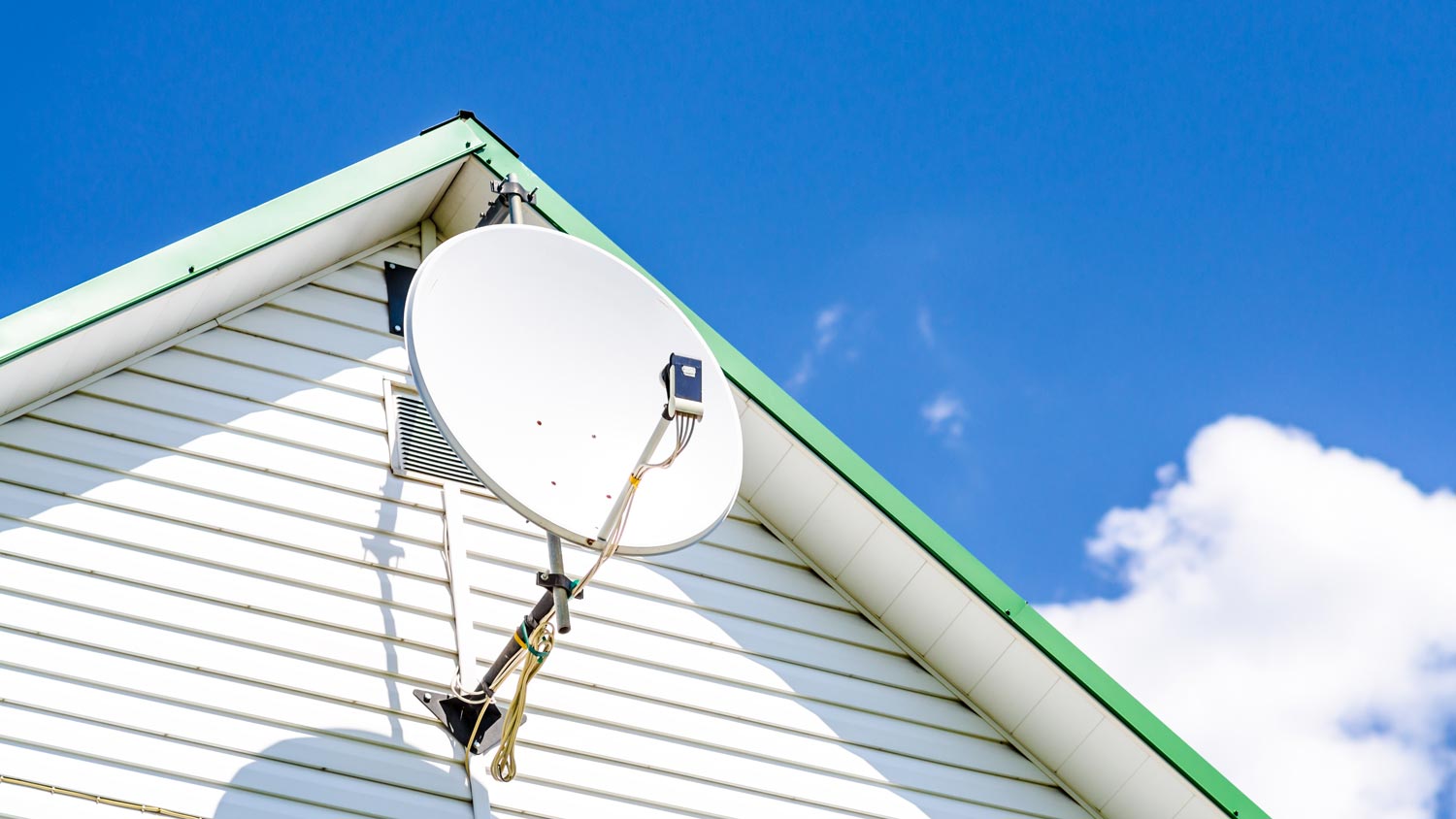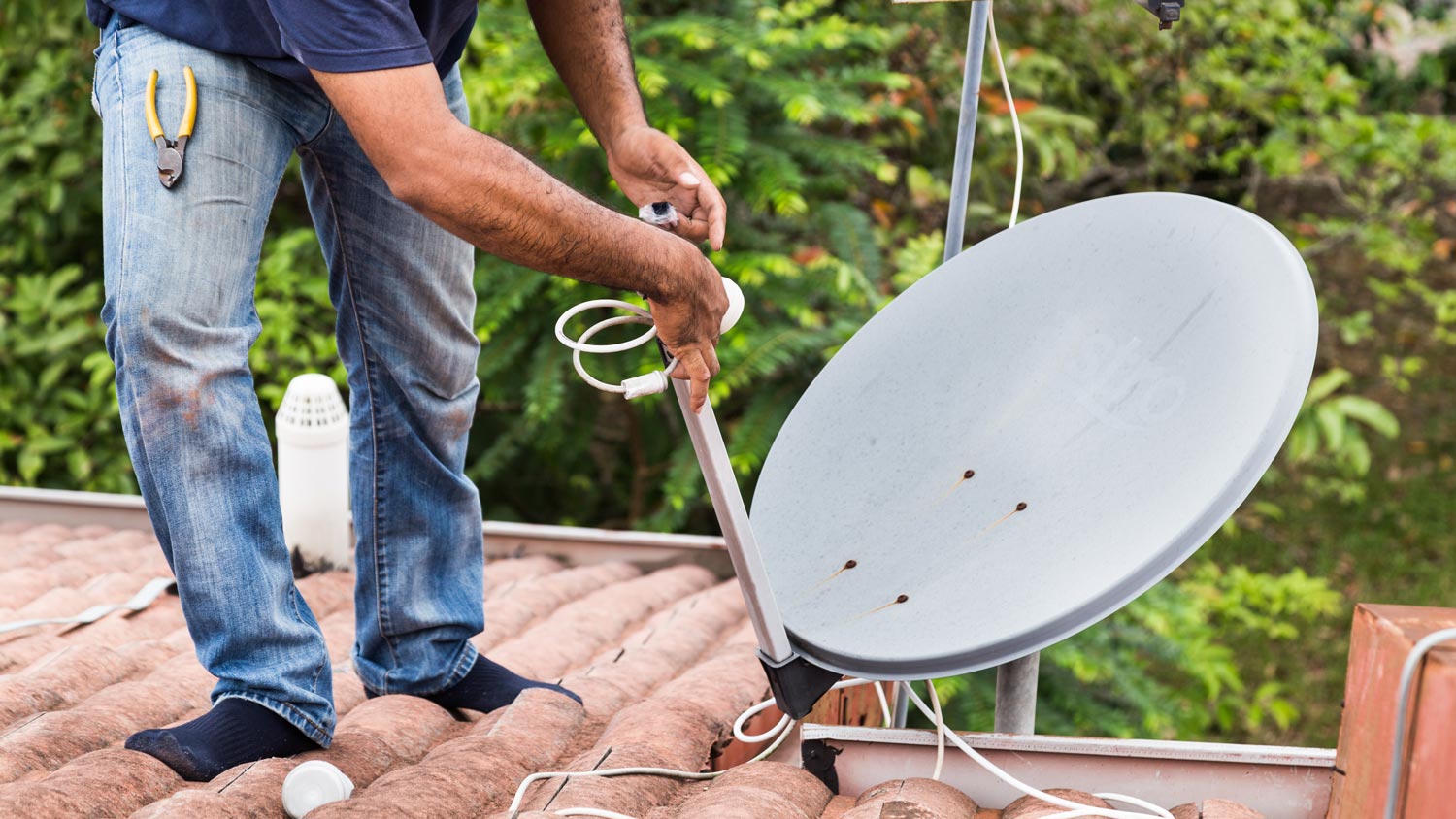
Find out the average satellite dish repair cost, key price factors, and tips to save. Get expert advice on budgeting for your satellite dish repair project.
The average satellite dish removal cost is $130, with most homeowners paying between $90 to $150. Main cost factors include dish type, location, and labor.


Satellite dish removal costs vary based on labor rates, dish size, mounting location, and ease of roof access.
Professional roofing experts cost between $50 to $100 per hour and ensure safe removal, reducing the risk of roof or siding damage.
Exterior home repair is a frequent add-on, with common repairs ranging from $50 to $400 for patching, sealing, or replacement.
Removing a satellite dish can boost curb appeal and protect your home from potential roof leaks.
This article was created using automation technology and thoroughly fact-checked and edited by an Angi Editor in accordance with our AI policy.
Satellite dish removal cost averages $130, with a typical range between $90 to $150. Homeowners may pay as little as $50 for a small, easily accessible removal or up to $1,100 or a large model in a hard to reach place. Prices depend on dish size, mounting location, and accessibility.
Removing a dish from a single-story home is usually less expensive than from a steep or multi-story roof. Labor and disposal fees are the main cost drivers.
Understanding what drives satellite dish removal cost helps you budget confidently and choose the right solution for your home. Each aspect, from dish type to labor, plays a role in the final price.
The size of your satellite dish directly impacts removal labor and safety needs. Small and medium dishes are usually manageable with basic tools, while large or oversized dishes can be heavy and awkward, sometimes requiring more than one technician or special equipment.
| Dish Size | Cost Range | Description |
|---|---|---|
| Mini (18-inch) | $100–$150 | Small, often wall-mounted, quick removal |
| Standard (24-inch) | $120–$200 | Most common residential size |
| Large (36-inch+) | $180–$295 | May require extra labor or equipment |
| Commercial | $250–$400 | Heavy, complex, often roof or ground-mounted |
Larger dishes not only take longer to remove but may also increase disposal fees due to their weight.
The material of your satellite dish and its mounting hardware can affect both removal complexity and disposal costs. Aluminum and steel are common and often recyclable, but heavier steel brackets or concrete bases require more labor. Composite dishes are lighter but can be trickier to recycle, leading to landfill fees. Disposal fees vary based on local recycling and landfill rates.
| Material Type | Removal Difficulty | Cost Range |
|---|---|---|
| Aluminum | Low, easy to cut/remove, recyclable | $0–$20 |
| Steel | Moderate, heavier | $10–$30 |
| Composite | Low, but landfill only | $20–$40 |
| Concrete base | High, requires breaking | $30–$75 |
Labor is often the biggest part of satellite dish removal cost. This job is performed by handypeople, roofing contractors, or professional satellite technicians. Hourly rates range from $50 to $100, while flat fees for removal are common. Costs rise in regions with a higher cost of living or for jobs requiring more than one worker.
Steep roofs, multi-story homes, and hard-to-reach installations add to labor time and safety requirements, which increases the total cost. Most standard removals take one to two hours, but complex jobs may take longer.
Proper preparation is essential for a safe and efficient removal. This includes disconnecting any active service, clearing obstacles, and ensuring safe ladder or roof access. Homeowners can sometimes handle basic prep, such as moving vehicles or patio furniture, but professionals bring their own safety gear and may charge for extra setup, especially for difficult-to-reach dishes. Permits are rarely needed for residential dish removal, but check local rules if your home is in a historic or regulated area.
Tipping for satellite dish removal is optional but appreciated, especially for challenging jobs. A standard tip ranges from $10 to $20 per worker or 10% of the total cost if the removal is complex or requires extra cleanup. Tipping is more common when the service provider goes above and beyond, such as patching holes or hauling away extra debris.
Several additional factors can increase your total satellite dish removal cost. Always ask your removal pro to detail these possible extras in your quote.
Demolition of mounting hardware, concrete bases, or large brackets
Cleanup and hauling away debris
Roof or wall repairs, such as patching holes or sealing leaks
Permit fees in regulated areas
Disposal or recycling charges for bulky or hazardous materials
Removal of associated wiring, signal boosters, or satellite receivers
Restoration work, such as shingle replacement or painting
After your satellite dish is gone, ongoing costs are minimal, but a few considerations remain.
There’s no regular maintenance required after removing a satellite dish. However, it’s smart to schedule periodic roof inspections, especially if the dish was roof-mounted, to check for leaks or water damage at the former mounting site. Minor repairs or sealing may be needed to maintain roof integrity, costing $50 to $250 depending on the scope.
Siding or roof repairs after dish removal are sometimes necessary, especially if holes or roof damage are left behind. Minor patching and sealing are common, while major repairs are less frequent but more costly. If repairs are extensive, it’s best to hire a roofer or contractor to ensure your home remains watertight and safe.
| Repair Type | Cost Range | When Needed |
|---|---|---|
| Roof patching | $75–$250 | Holes left from mounting hardware |
| Leak sealing | $100–$300 | If water damage is detected |
| Siding repair | $150–$400 | For wall-mounted dish removals |
Some homeowners consider tackling satellite dish removal themselves, but it’s important to weigh the real costs and risks.
DIY satellite dish removal costs include basic tools (wrenches, screwdrivers, ladder), safety gear, and disposal fees—which can total $30 to $75, not including your time. You’ll save on labor, but risk personal injury, roof damage, or improper disposal. DIY removal requires comfort with heights, proper tools, and the ability to safely patch holes or seal the roof.
Most DIY jobs take one to two hours, while pros may finish faster and guarantee repairs. Improper removal can void roof warranties or harm your home’s value. It’s best to hire a local satellite technician pro for complex installations, steep roofs, or multi-story homes.
Satellite dish removal projects often involve optional add-ons that affect the total cost. These add-ons are often bundled with removal for convenience.
| Add-On Service | Cost Range |
|---|---|
| Removal of extra dishes/antennas | $50–$150 per unit |
| Disposal/recycling of equipment | $20–$75 |
| Roof or siding repair | $75–$400 |
| Removal of wiring/cabling | $25–$100 |
| Patching mounting holes | $50–$200 |
| New TV/internet equipment install | $100–$300 |
| Gutter/roof cleaning | $75–$200 |
| Painting/cosmetic repairs | $50–$250 |
There are several ways to keep your satellite dish removal costs wall-friendly without sacrificing quality. Taking these steps can help you save money and get the the service you want:
Obtain multiple quotes from satellite removal pros to compare pricing and services.
Prepare the area by clearing obstacles or removing accessible wiring or accessories yourself to save on labor time
Bundle your satellite dish removal with other home maintenance tasks to take advantage of package discount
Schedule removal during off-peak roofing seasons when pros may offer discounts
Recycle the dish and hardware to offset or eliminate disposal fees
Ask about flat-rate versus hourly pricing to avoid unexpected charges
Home is the most important place on earth, which is why Angi has helped more than 150 million homeowners transform their houses into homes they adore. To help homeowners with their next project, Angi provides readers with the most accurate cost data and upholds strict editorial standards. We extensively research project costs to develop the pricing data you see, so you can make the best decisions for you and your home. We rely on reputable sources, including the U.S. Bureau of Labor Statistics, academic journals, market studies, and interviews with industry experts—all to ensure our prices reflect real-world projects.
Want to help us improve our cost data? Send us a recent project quote to [email protected]. Quotes and personal information will not be shared publicly.